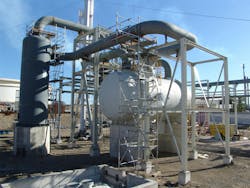Canadian Tribe Investing $1M in Hydrogen Fuel Cell Partnership with Arizona Company
RONN, a multinational zero-emission hydrogen fuel cell electric automaker and sustainable hydrogen stationary company based in Scottsdale, Arizona, has partnered with the Tobique First Nation to develop hydrogen production and infrastructure on tribal lands.
The Tobique First Nation is making an initial investment of $1 million in the development phase.
The agreement will provide the possibility of future hydrogen infrastructure sales, ongoing operational income, fuel cell electric vehicle truck sales, and future revenues from hydrogen sales.
The Tobique First Nation, which is based on a reserve located in New Brunswick, Canada, plans to maximize the potential use of their new wind farm by working with RONN to evaluate and potentially produce power for hydrogen production, reflecting a recent $430 million partnership between Canada and Germany. The latter two nations recently signed a trade agreement revolving around the sale of future hydrogen produced in Canada.
Green hydrogen does not contain carbon emissions, but can only be generated from electrolyzers powered by renewable energy resources.
“Partnering with RONN Inc. to develop hydrogen hubs within New Brunswick, the Tobique Nation and surrounding areas represent a unique opportunity to capitalize on the growing clean energy market and the net zero clean emissions initiative,” Julian Moulton, Tobique First Nation leader, said in a statement. “This initiative promises economic benefits, environmental stewardship and technological leadership, making it a compelling investment for sustainable future growth.”
The collaboration will involve various stakeholders, including Tobique First Nation taking the lead, local city officials, and private commercial industries for the sustainable growth of the region.
The Tobique reserve is nearly 20,000 acres currently and where close to two-thirds of members live. The nation is one of six Wolastoqiyik or Maliseet Nation reserves in New Brunswick.
